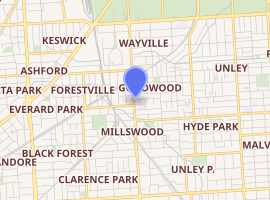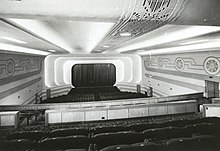Capri Theatre
The Capri Theatre is a heritage-listed cinema in Goodwood, a suburb of Adelaide, South Australia, built in the Art Deco style in 1941. It was formerly called the Goodwood Star, New Curzon, and Cinema Capri.
| Capri Theatre | |
|---|---|
Capri Theatre, built in 1930 | |

| |
| Former names | Star Theatre, New Curzon, Cinema Capri |
| General information | |
| Architectural style | Art Deco |
| Address | 141 Goodwood Road, Goodwood |
| Town or city | City of Unley, South Australia |
| Country | Australia |
| Coordinates | |
| Completed | 1941 |
| Design and construction | |
| Architect | Christopher Arthur Smith |
It is owned by and is home to the Theatre Organ Society of Australia (SA Division). A notable feature of the cinema is the Wurlitzer theatre organ, which is used regularly for recitals, as well as an entertainment feature supporting the screening of films.
History

The cinema was designed by renowned Art Deco architect Christopher Arthur Smith.[1] It was built by R.J. Nurse of Norwood, and the interior decoration was by a Mrs B.A. Gordon. The original plans show the name "Savoy", but it was initially named the Goodwood Star.[2]
The cinema opened on 8 October 1941 as the New Star Theatre, replacing the existing 1920-built Star Theatre which still stands, two doors southwards.[3][4] It was part of the Clifford Theatre Circuit[5] and had a seating capacity of 1,472 persons.[6][3] The films shown on opening night were Robert Young in [[Florian (film)|Florian]] and Lew Ayres in Dr. Kildare Goes Home.[3]
Greater Union acquired the cinema 1947,[5] as part of their acquisition of the Clifford Circuit.
The cinema was renamed as the New Curzon on 21 February 1964, then again as the Cinema Capri on 16 November 1967,[3][5] when Greater Union took out most of the Art Deco interior decorative features and reduced the seating capacity to 851.[6]
The Theatre Organ Society of Australia (South Australian Division) Inc. purchased the cinema in 1978, and they relaunched the cinema as the Capri Theatre.[7] Many of the interior features have been retained and restored since then,[2] with an appeal launched by the National Trust of Australia to repaint the exterior for the theatre's 75th anniversary in 2016.[8]
Installation of the "Mighty Wurlitzer"
The Theatre Organ Society (TOSA) installed a Wurlitzer theatre organ,[9] after altering the proscenium arch to allow for it,[2] with the pipe work in glass fronted chambers along each side of the screen. The inaugural concert took place on 2 April 1983.[9][7][3]
The organ had been built in Sydney, before being moved to Darwin for some years, finally being moved to Adelaide by TOSA not long before Cyclone Tracy devastated the house it had been kept in.[10]
As originally installed, the organ had four keyboards and 13 sets of pipes (ranks). These were added to, until as of 2020 it has 29 ranks, making it the second largest in the Southern Hemisphere. The pipework has been progressively installed in glass-fronted chambers, unique in a theatre or cinema.[7]
Heritage listing
On 27 September 1990 the cinema was placed on the South Australian Heritage Register.[11][2][6]
Authentic Art Deco restoration
While the cinema has modern presentation features, its appearance has been carefully restored to its 1941 Art Deco design, including:
- Exterior and interior decoration restored to original 1941 colours and styles
- Original 1941 design carpeting
- Replica 1941 Art Deco fireplace, mirror & wooden Venetians in the upstairs foyer
- Club Lounges and replica 1941 round column seating in both foyers
Features, operation and programming
The cinema is a single-screen cinema, with 750 seats on two levels. It is available for hire, specialising in fund-raising events,[12] and is used as a venue for Adelaide Fringe events.[13]
The cinema had a new digital projection system installed in 2012, with the assistance of the South Australian Government and Unley Council.[6] Upstairs, it features lounge seats, including double "love seats".[14][6]
The cinema is run as a not-for-profit organisation, run mostly by volunteers and with all profits spent on the upkeep of the building and its famous organ.[15][7]
The cinema operates mainstream cinema programming. Several times a year, it presents "Nostalgia Movie Nights", when popular classic films are shown, in a programme with supporting short films, a newsreel and nostalgic advertising. Another regular event is the "Cult at the Capri", when two films are shown.[15][7]
The Wurlitzer is played before sessions on Tuesday, Friday and Saturday evenings,[15] is also used for regular organ concerts, featuring local and international organists.[3]
See also
- Rod Blackmore Author of Australasian Theatre Organs
References
- "Architect Details: Christopher (Chris) Arthur". Architects of South Australia. University of South Australia. Retrieved 27 July 2020.
- "Building Details". Architects of South Australia. Retrieved 29 July 2020.
- "Capri Goodwood in Adelaide, AU". Cinema Treasures. Retrieved 30 July 2020.
- "Google Maps". Google Maps. Retrieved 30 July 2020.
- "Theatre organ society preserves the Capri; Wests becomes home to Adelaide orchestra". AdelaideAZ. Retrieved 30 July 2020.
- "History of the Capri". Capri Theatre. Retrieved 30 July 2020.
- "About the Capri". Capri Theatre. Retrieved 30 July 2020.
- "Capri Theatre Conservation Appeal". National Trust. 11 May 2017. Retrieved 30 July 2020.
- "Capri Theatre, Goodwood". Archived from the original on 24 December 2013. Retrieved 7 January 2014.
- "Capri Theatre, Goodwood". The Theatre Organ Home Page. Retrieved 30 July 2020.
- "Capri Theatre". The South Australia Heritage Places database. Retrieved 29 July 2020.
- "Hire the Capri". Capri Theatre. Retrieved 30 July 2020.
- "Capri Theatre". Adelaide Fringe. Retrieved 30 July 2020.
- "French Crafts". pinterest. Retrieved 30 July 2020.
- "Capri Theatre - Cinema & Function Venue". Hidden City Secrets. Retrieved 30 July 2020.